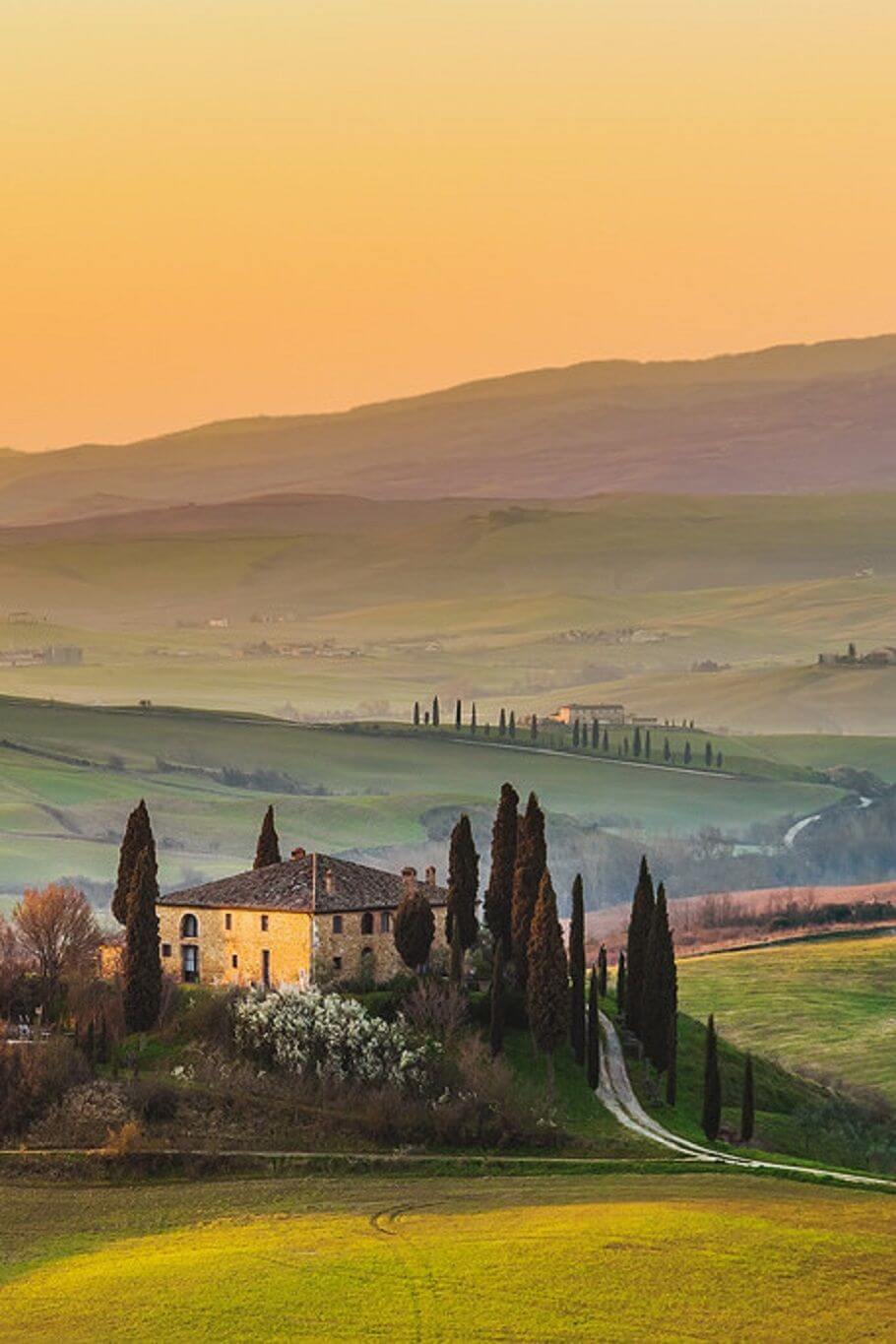Self-Knowledge • Melancholy
Why Very Beautiful Scenes Can Make Us So Melancholy
As inhabitants of the modern world, the major part of our lives is spent in ugliness: under polluted leaden skies, among choked motorways, warehouses, freight depots and graffitied shuttered shops. These environments continuously whisper to us that we are worthy of ridicule – and that we should swiftly go home and hide.
Then, on a few rare occasions, we end up somewhere sublime. We might have arrived at the old farmhouse late last night and only now, in the early morning, do we have a chance to see where we really are. We open the heavy rusty shutters and take in the vista before us: soft rolling hills dotted with dark green cypress trees, fields of lavender and poppies, a limestone village on the horizon, a little church in the middle of an orchard, a stream below the house, bordered with weeping willows and clumps of bluebells – all of it emerging under flawless azure skies, as though none of us had ever been expelled from paradise and there was no such thing as death or pain. Someone forgot to tell this part of the world about human tragedy.

We feast on the scene and let the sun warm our face. It seems like the most exquisite setting we have ever seen or have perhaps been to since we were children. And to think that only yesterday, we were back in the city in the apartment, looking at a rain stained concrete wall opposite, the windows reverberating to the sounds of lorries idling at the lights below.
We should be happy – and in a way we are. Very happy. A farmer is leading some goats across the valley. A couple of children are cycling towards the village. But the beauty has also edged us into melancholy. We aren’t sad because it isn’t beautiful enough but precisely because it is so beautiful – of a kind of beauty we cannot bear to have been away from for so long, to have to live in exile from for most of our lives.

Beauty has served to highlight, by contrast, everything that has come before. We notice – in a way we couldn’t yesterday – how much disappointment, violence, meanness and humiliation has been written into the structure of our ordinary surroundings and routines and has from there seeped into our souls. Thanks to the little limestone church (that we’ll visit after breakfast) assembled by craftsmen around 1430 and ringing its bells for morning service, we’re finally in a position to feel how much agony is latent in our hearts. We haven’t been pain-free all this time, we’ve just been numb, holding in our sorrow because there was nowhere to discharge it, because there were no alternatives to it and nothing to remind us of the scale of our compromise.
The beauty of the landscape is like the very kind friend who, after a period of turmoil, puts a hand gently on ours and asks how we have been – and does so with such tenderness and intelligent concern, we surprise ourselves by bursting into tears that don’t stop for a very long time. It takes kindness until we can realise how much suffering we were holding in. It takes beauty until we realise how far we have drifted from our better selves.
Of course, we want to move here. Somehow. We plot – as we have plotted so many times before, always in vain – how we might be able to throw in the job, sell the apartment and have a few years in a little cottage. Every morning we would wake up to this and head out to fetch the newspaper and pastries before filling the day with purpose and clever intent. But we also know it will never happen; and this is part of the mounting sadness. We have been reminded of a better way of living and – simultaneously – of our brute-headed inability to reform ourselves.

It isn’t just the physical beauty that’s touching us, it’s everything that the beauty speaks of: confidence, clarity, ambition, virtue. Why have we drifted so far from all the values we hold dear, how have we allowed ourselves to be so far from what matters? We are crying because this is where we belong – and yet cannot find our way to. The plane leaves the day after tomorrow.
We don’t begin to know how to do such beauty justice. We are so trained in the arts of resignation, disappointment and surrender, we are such masters at defeat, this offering embarrasses us. We take a stream of photographs, but they aren’t really what we are after. We want to become somebody else, not just hold on to pictures of a valley. We are too internally troubled for such sublimity.
That’s why, on top of everything else, in one of the nicest places on earth, we have managed to be sad. Someone comes in and sees our eyes filled with tears. They wonder sweetly if they could fetch us anything to eat – or a taxi to go sightseeing. But we are far stranger than we can begin to explain. We are crying tears of joy at a goodness we have missed out on; we are crying because we don’t know how to nourish ourselves, we are crying at the sight of a happiness we are emotionally too cowardly, defensive and inept to know how to make our own. We are crying because we don’t want to be tourists, we want to be reborn.


























